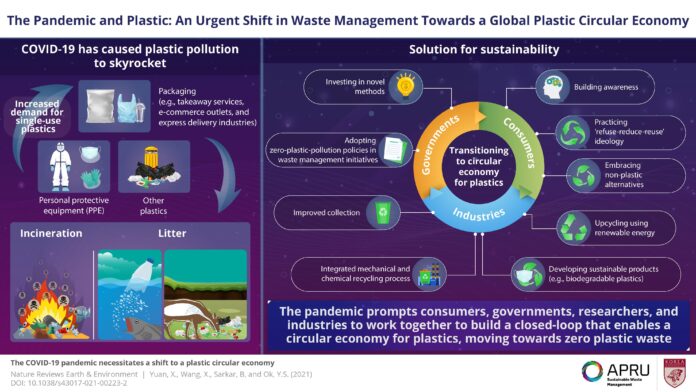Scientists alert that COVID-19 has greatly exacerbated plastic pollution and propose a paradigm shift towards a plastic circular economy
The COVID-19 pandemic caused an explosive increase in the demand of disposable plastic products, stalled the implementation of sustainable policies, and evidenced the inherent problems of today’s waste management schemes. Now, in a recent article in Nature Reviews Earth & Environment, scientists comment on the necessary courses of action for governments, industries, researchers, and consumers to help us transition to a sustainable plastic circular economy.
The COVID-19 pandemic caught most of us off-guard, with governments and institutions having to quickly implement new safety policies and citizens rushing to acquire masks, gloves, and other cleaning and protective items. The timing of the pandemic was particularly unfortunate because humanity was just beginning to really focus on another global threat that, by now, has markedly worsened: plastic pollution.
But how is the COVID-19 pandemic related to plastic waste? In a recent article published in Nature Reviews Earth & Environment, a research team led by Professor Yong Sik Ok from Korea University comment on this important issue. They describe past and current trends in plastic consumption and waste management and explain the impact that the COVID-19 pandemic has had in these regards, as well as how we should respond to these changes to shift into a plastic circular economy in the foreseeable future.
The consumption of plastic skyrocketed in 2020 during the first months of the outbreak, with estimations indicating that twice the amount of plastic waste was generated in total in 2020 compared with 2019. A significant portion of this increase came solely from the surge in demand of disposable face masks, gloves, hand sanitizers, and personal protective equipment. Another part is related to the huge rise in food takeaway and home delivery services, which require disposable packaging. To top this off, many regulatory measures and plans meant to reduce plastic waste had to be delayed or rolled back during the pandemic, stalling or outright reversing the longstanding global fight against plastic pollution.
In the article, the researchers highlight the need to accelerate the transition to novel sustainable practices with regards to plastic waste. “In the long-term, current plastic waste management schemes alone cannot keep pace with the estimated growth in waste generation, even if capacity is increased,” warns Prof. Ok. For this transition to become a reality, everyone will have to play their part.
Governments should push for new incentives and policies in relation to waste management, seeing how current strategies have proved woefully incapable of dealing with the increasing amount of disposable PPE. Better recollection and separation logistics, as well as novel chemical and mechanical processes to recycle plastics, are essential to achieve these goals. As for industries, they should strive to adopt the latest technological breakthroughs in terms of sustainability. To truly close the plastic loop, they will need strategies for the long-term upcycling of plastic waste using renewable energy, so as to also be in line with the current agenda to decelerate climate change. Finally, in the consumer side, it’s important that more people adopt a ‘refuse–reduce–reuse’ ideology and opt for plastic-free choices when possible.
More awareness of the problems caused by plastics will hopefully kickstart these changes. To name but a few, plastic pollution causes sickness and death of marine and freshwater lifeforms, loss of biodiversity, air and soil pollution in the form of micro- and nanoplastics, and human health issues that we are just beginning to comprehend. In addition to increased awareness, we will need research communities to further develop and refine promising technologies to combat plastic waste. One important candidate is biodegradable plastics, which still warrant a comprehensive footprint assessment to check if they will be applicable at the industrial scale. Moreover, efficient catalytic conversion schemes for plastic upcycling should also take their place in the spotlight as key enabling technologies to turn waste into value-added products.
Overall, even though our situation looks dire today, we are still in time to reverse it. “Closing the loop on plastic might not be a reality just yet. However, heightened consumer awareness, increased industry innovation, expanded government investment, and continued research can mitigate plastic burdens on the environment and develop a society guided by a circular economy,” says Prof. Ok. Let’s hope that, in spite of all the problems the COVID-19 pandemic has caused, it brings us together in the fight for a more sustainable future.
***
Help keep news FREE for our readers
Supporting your local community newspaper/online news outlet is crucial now more than ever. If you believe in independent journalism, then consider making a valuable contribution by making a one-time or monthly donation. We operate in rural areas where providing unbiased news can be challenging. Read More About Supporting The West Wales Chronicle
























